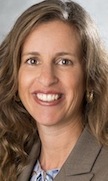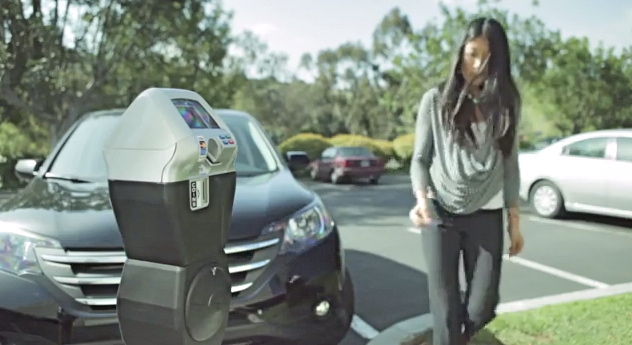Daily Business Report-Oct. 30, 2014
The ‘smart’ parking meters are from the IPS Group Inc., a Sorrento Valley company that’s a leader in its field.
City Begins Installing ‘Smart’ Parking Meters Downtown
The city of San Diego is installing around 200 “smart” parking meters beginning this week that will accept credit card payments and track usage of spaces.
The devices, which cost a total of $3.8 million, are replacing traditional single-space meters that only accept coins, according to the office of City Council President Todd Gloria, who is planning a news conference Thursday to discuss the new meters.
The meters San Diego is installing are made by IPS Group Inc., a Sorrento Valley company that’s a leader in the field.
“Bringing smart parking meters to San Diego was on the short list of things I wanted to accomplish during my tenure as (interim) mayor, and I know San Diegans and visitors will notice the improvement this week upon their installation,” Gloria said.
“San Diego is a city of innovation and people here should not resort to the antiquated practice of searching for coins for parking meters,” he said. “With more user-friendly parking meters, customers will be able to more easily patronize the small businesses throughout downtown, Uptown, and Mid- City, contributing to the economic development of our city.”
About 97 percent of San Diego’s parking meters are being replaced, according to Gloria’s office. The devices use the city’s existing meter poles, making installation easier and preserving useful current infrastructure.
The smart meters are being installed first in the Gaslamp Quarter, with other areas of downtown to follow. The meters will be installed in the Uptown and Mid-City areas early next year.
When installation is complete, the city plans to start a pilot project to to let customers pay via their mobile phones.
Data from the meters will be used to guide the future policies of the city and community parking groups, Gloria said.
— Times of San Diego, with City News Service

Balboa Park Gets $1 Million Tech Grant
A $1 million grant from the James Irvine Foundation will double the reach of the free public wireless Internet system in Balboa Park, making it one of the largest and fastest free public WiFi spots on the West Coast, Mayor Kevin Faulconer and City Council President Todd Gloria said Wednesday.
In addition, the grant will support a new initiative to use interactive kiosks and smartphone apps to enhance the visitor experience at Balboa Park as it approaches its 100th birthday, they said.
“The momentum is building for a fantastic 2015 centennial thanks to generous contributions like this from the James Irvine Foundation,” Faulconer said. “This grant will fund improvements to elevate Balboa Park, create more opportunities for visitors and ensure Balboa Park remains San Diego’s crown jewel for the next 100 years.”
The coverage area for Balboa Park’s existing WiFi network will be expanded to roughly 250 contiguous acres, ensuring reception in outlying parking lots, gardens and the West Mesa, as well as the various cultural attractions in the park.
“This substantial upgrade to Balboa Park’s wireless network, coupled with other visitor-centered projects, will provide greater access and engagement to park institutions for San Diegans and other patrons,” Gloria said.
City officials said the smartphone app will enable self-guided tours of the park. The kiosks will allow patrons to purchase or renew their Explorer Pass, which provides entrance to park institutions.
The city oversees the centennial planning, which is being handled by the Balboa Park Conservancy and Balboa Park Online Collaborative.
— City News Service

Jerry Brown and Toni Atkins Rally
Bipartisan Support for Prop. 1 Water Bond
Gov. Jerry Brown and Assembly Speaker Toni Atkins rallied bipartisan support Wednesday for Proposition 1 — the $7.5 billion state water bond on the Nov. 4 ballot — during a visit to the San Diego County Water Authority headquarters.
“Nothing is more fundamental than water,” Brown said. “We have to pull together and use our technology and wealth.”
The governor was backed by Water Authority Board Chair Mark Weston, San Diego Mayor Kevin Faulconer and a large group of state legislators from both parties, including Sen. Joel Anderson, Sen. Marty Block, Sen. Ben Hueso, Assemblymember Rocky Chavez, Assemblymember Lorena Gonzalez, Assemblymember Marie Waldron and Assemblymember Shirley Weber.
Proposition 1 would provide money for water-use efficiency and recycling, groundwater cleanup and management, as well as $2.7 billion for additional water storage. It also would invest in safe drinking water, particularly in disadvantaged communities, and provide for watershed restoration and increased flows in some of California’s most important rivers and streams, including the San Diego River.
“It’s an integrated water plan that takes care of all the different aspects of what’s needed to invest and recycle water,” Brown said.
The water authority board has unanimously endorsed the measure.
— Times of San Diego
Popular Coffee Chain Close to
Opening in Downtown Library

The City Council’s Public Safety and Livable Neighborhoods Committee on Wednesday cleared the way for one of San Diego’s most popular coffee house chains to open shop at the Downtown Central Library. If approved by the full City Council at a future meeting, The Living Room would operate a cafe in a plaza area in front of the facility, which opened just over a year ago.
The proposed three-year deal is with Nine Dragons Inc. — the chain’s owner — which has operated various establishments in the area for three decades, including six concessions at Lindbergh Field.
The Living Room has locations near San Diego State University, La Jolla, Point Loma and National City. Coffee, baked goods, salad and other food items would be offered at the library location.
The agreement calls for Nine Dragons to pay rent of $500 a month, or 6 percent of gross revenues at the library location — whichever is greater. The company would also be allowed one two-year option to renew.
— City News Service
Poll Workers Still Needed for Nov. 4 Election
Time is running short and poll workers, especially those who are bilingual in any one of eight specific languages, are still needed for the Nov. 4 Gubernatorial General Election. The San Diego County Registrar’s Office is required by federal law to provide bilingual speakers and voting materials to voters who speak Spanish, Filipino, Vietnamese and Chinese. In addition, bilingual poll workers are needed who speak Khmer, Japanese, Korean and Hindi.
The Registrar also needs standby poll workers who can be assigned on short notice. Standbys who can also speak a second language are in demand, too.
Poll workers receive a stipend ranging from $75 to $175 depending on the assignment, and those who are bilingual receive an additional $15 if they are assigned specifically to provide language assistance to voters.
Poll workers must be registered voters in the state of California or must be permanent legal residents in the United States and have transportation to their assigned polling location; they will also need access to the Internet to complete an online training and attend a two-hour class.
2015 Housing Market Forecast
The Pacific Southwest Association of Realtors will host a 2015 Housing Market Forecast from noon to 1:30 p.m. on Wednesday, Nov. 5, at the PSAR East County Service Center, 1150 Broadway, El Cajon. Topics will include next year’s housing market, as well as inventory, pricing and interest rate predictions. Speakers will include real estate economist Alan Nevin and Clint Daniels, San Diego Association of Governments. Cost to attend is $10 for PSAR members, $20 for nonmembers. To RSVP, phone (619) 579-0333.
EEG Test to Help Understand
and Treat Schizophrenia
Researchers at the UC San Diego School of Medicine have validated an EEG test to study and treat schizophrenia. The findings, published in two separate studies, offer a clinical test that could be used to help diagnose persons at risk for developing mental illness later in life, as well as an approach for measuring the efficacies of different treatment options.
One of the studies, reported online Oct. 23 in Schizophrenia Research, shows that schizophrenia patients don’t register subtle changes in reoccurring sounds as well as others and that this deficit can be measured by recording patterns of electrical brain activity obtained through electroencephalography (EEG).
The second, published online earlier this month in NeuroImage: Clinical, establishes a link between certain EEG tests and patients’ cognitive and psychosocial impairments, suggesting that the EEG test could be used to objectively measure the severity of a patient’s condition, and conversely that it might be possible to alleviate some of the symptoms of schizophrenia with specialized cognitive exercises designed to strengthen auditory processing.
Victoria Fuller Receives Pro Bono Award

Victoria Fuller, an attorney wih Higgs Fletcher & Mack, has received Casa Cornelia’s Inn of Court Pro Bono Publico Award. Fuller was selected along with 10 other volunteer attorneys to receive this award.
Fuller handles appeals and writs in a range of practice areas, including business disputes, employment litigation, personal injury cases and family law matters. In addition to providing pro bono legal services to Casa Cornelia Law Center representing applicants for political asylum in appeals before the Board of Immigration Appeals and the Ninth Circuit, she also serves as a member of the board of directors of the Blacks Beach Foundation, a group of surfers dedicated to protecting the environment at Blacks Beach.
SDSU to Host Meeting of White House
Advisers and School Counselors
San Diego State University will host the West Coast meeting of leaders and advocates for the school counseling profession, which will take place Nov. 17-18 at SDSU’s Conrad Prebys Aztec Student Union. The focus will be on creating and implementing action plans for improving school counseling programs, with the goal of increasing college access for all students.
SDSU is hosting the meeting in partnership with the White House’s College Opportunity Agenda and the First Lady’s Reach Higher Initiative.
“We know that access to high quality school counseling is essential for all students, especially first generation, low-income students, in order to make post-secondary completion a reality,” said Eric Waldo, executive director of First Lady Michelle Obama’s Reach Higher Initiative.
Personnel Moves
Matt Grosz Joins Chelsea Investment Corp.

Chelsea Investment Corp. has named Matt Grosz as its chief investment officer, with responsibility for business development, origination activities, and as its liaison to financial stakeholders and community development partners. Grosz joined CIC in 2011 as a project manager. Under his leadership, CIC expanded its Southwest geographic footprint and managed the acquisition, financing and closing of more than 400 residential units in California and New Mexico.
Prior to joining Chelsea, Grosz operated as an investment and mortgage banker for Red Capital Group, specializing in low-income housing tax credit syndication and agency-backed multifamily mortgage banking.
Rudolph and Sletten Hires Project Manager

General contracting firm Rudolph and Sletten has hired Mark Freeman as a project manager. Freeman’s resume includes project management of three Southland Nordstrom stores including Thousand Oaks, Glendale, and Fashion Island in Newport Beach. Freeman has spent the last nine years commuting to the Los Angeles area, where he managed major construction projects for a large general contractor. His resume also includes project management for a large Southern California casino, office buildings, and municipal facilities such as fire stations and libraries. Freeman is a
graduate of Texas A&M University. He started his career in the Texas market, working as an engineer, estimator and project manager in Dallas.


